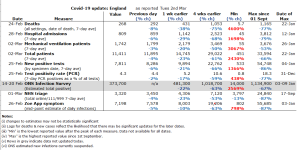First jab appointment in a week, second in June. Bit of a faff - nearest centre is more than 20 miles away, and my first 5 attempts to book online were not done fast enough and my booking was no longer available after I confirmed it. I guess there are millions of duffers in their 60s all trying to make the same bookings today.
Also....initially the NHS site found my nearest centre to be 17 miles away, in Westcliffe. But the Westgate it found isn't 17 miles away, it's 65 miles away. The website has Westgate in Kent mixed up with Westgate in Essex. Lucky I spotted that (after I'd booked).
I pity the poor sods who are trying to book by phone. Kent is very primitive.
Anyway, good news for me, I think.
Also....initially the NHS site found my nearest centre to be 17 miles away, in Westcliffe. But the Westgate it found isn't 17 miles away, it's 65 miles away. The website has Westgate in Kent mixed up with Westgate in Essex. Lucky I spotted that (after I'd booked).
I pity the poor sods who are trying to book by phone. Kent is very primitive.
Anyway, good news for me, I think.


